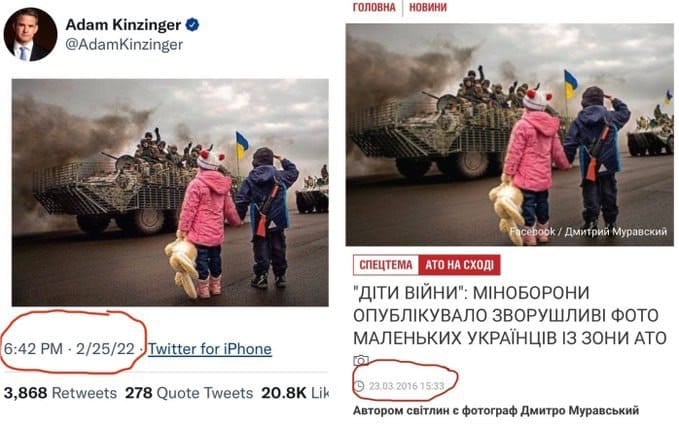 Back
Back

Russia’s expansion into Ukraine eight years ago has led to ongoing hostilities in some parts of the country. A large number of photographs and videos illustrating those acts of war can be found in the information space, originating even before the new large-scale assault on Ukraine that started this February. Researchers at DIGIRES, Baltic Research Foundation for Digital Resilience, point out that the use of such material is inadvisable as it helps the Russian disinformation machine to construct a dangerous narrative that the war in Ukraine may not be even happening.
“There are a number of cases where the Russian propaganda machine starts republishing recent internet posts with photos and videos of old hostilities. Usually, propagandists try to “debunk”’ such cases by claiming that the other side is manipulating the old footage, while in reality there is no war”, says Aistė Meidutė, a journalist, certified fact-checker, and lecturer at the DIGIRES training for journalists.
According to Meidutė, there are a lot of Ukraine supporters in Lithuania, which is why disinformation in the Lithuanian language is spread mostly by so-called “trolls”. “It’s clear to us how they operate, but there is another side: people who sympathize with Ukraine tend to share lots of outdated and misplaced information. They use old photographs and videos of old events, which supposedly reflect current events in Ukraine, as well as slightly embellished stories of victories of Ukrainians, which are later treated in hostile space as propaganda or even manipulative material supporting Ukrainian troops. We would therefore recommend that people share only genuine, verified, and responsibly produced material, preferably with links from professional media channels”, says Meidutė.
As old photographs or videos are found in information sources on both sides of the war, fact-checkers face great challenges in interpreting them correctly. In such cases, information becomes a weapon, a cover for claiming that hostilities or explosions are fake because someone used an old photo. “As fact-checkers, we are obliged to maintain a neutral stance during the conflict. Therefore, we warn that embellished, emotional images cut out from the footage of previous conflicts should not be circulated, just like manipulations from the other side, and that the sharing of posts on social media these days must be extremely responsible and thoughtful”, says the journalist.

Dr. Auksė Balčytienė, the coordinator of the DIGIRES Centre, believes that these days it is very important for people not to get overwhelmed with emotions and rush to share everything that evokes positive or negative feelings. Unverified, emotionally “loaded” information can be very quickly used for the opposite purpose. “Under the umbrella of the Baltic Research Foundation for Digital Resilience, scientists, researchers, journalists, and media literacy specialists are actively looking for ways to help the public make sense of the abundance of information, to strengthen its resistance to untruths, and, at the same time, to increase its information literacy and the authority of journalists and professional media”, says prof. dr. A. Balčytienė.
One of the most practical and easy-to-implement recommendations, she says, would be to refrain from acting too quickly on social networks and recklessly sharing impressions, news, and posts about the war, especially if they raise even the slightest suspicion of a lack of factuality.
DIGIRES is a joint initiative of the academic community, media organizations, and independent journalists to detect, analyze, and counter disinformation activities in Lithuania and beyond. DIGIRES is co-funded by the European Commission. For more information visit www.digires.lt